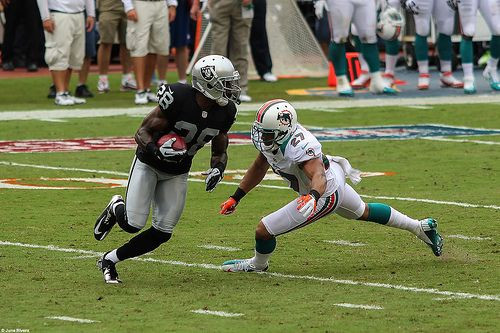West Coast NFL Teams Benefit From Time Difference Thanks To Jet Lag And Circadian Rhythms

As football players take to the gridiron this Thanksgiving, a new study from Stanford and Harvard exposes some truth to a theory that has perpetuated in the National Football League for years: West Coast teams have a distinct advantage over East Coast opponents due to jet lag.
“Over the past 40 years, even after accounting for the quality of the teams, West Coast NFL teams have had a significant athletic performance advantage over East Coast teams,” said lead author and sleep physician Dr. Roger Smith of Harvard. “Both the power and the persistent nature of this sleep-related athletic advantage were surprising.”
The study, published in the journal SLEEP, looked at 106 games between 1970 and 2011 where East Coast teams traveled west and had to play after 8 p.m. EST. The outcomes from these contests were compared against 293 similar games that were played earlier in the day.
The researchers used the Las Vegas point spread as a baseline for comparison. The Las Vegas point spread is a number assigned by bookmakers that describes which team is favored to win by accounting for variables like the quality of the teams and home field advantage.
If the West Coast teams did have an advantage in late games, then they would be expected to beat the spread – in other words, defy expectations – more often than not.
This is exactly what the investigators found, and the relationship was dramatic. The West Coast beat the spread in two out of three night games played after 8 p.m. EST, and they did so by an average of 5.26 points. Meanwhile, there was no significant difference between these opponents when they played during the afternoon.
“This study is a reminder that the body has an intricate timing system that regulates both sleep and aspects of human performance,” said American Academy of Sleep Medicine President Dr. M. Safwan Badr, who was not involved in the study. “We function best when we maintain a daily routine that promotes healthy sleep, which is critical for daytime alertness, performance and public safety.”
The findings provide further fuel for the growing theory that sleep is a critical component of athletic performance. Previous work from one of the authors, Cheri Mah of Stanford, showed that our natural production of performance enhancers, like human growth hormone, kicks into gear during sleep. In this earlier study, sleep was beneficial to a broad range of sports – sprinters were faster, basketball players made more jump shots.
“Applying principles of sleep physiology to competitive sports has the clear potential to yield a significant and natural athletic performance advantage,” said Smith. “So if you are an athlete looking for a natural performance advantage, or if you just want to improve your health, talk with your doctor about your sleep.”
Source: Smith RS, Efron B, Mah CD, Malhotra A. The Impact of Circadian Misalignment on Athletic Performance in Professional Football Players. SLEEP. 2013.
Published by Medicaldaily.com



























